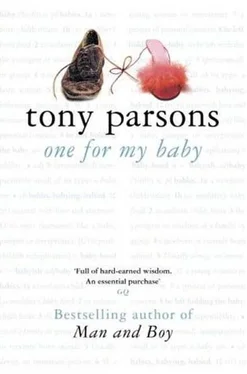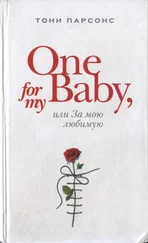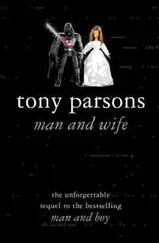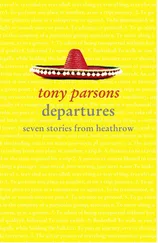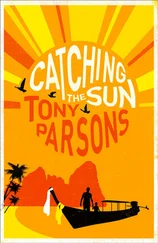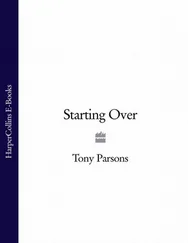Rose and the turtle and the ship were gone. I was going down into the freezing blackness and I couldn’t stop myself. There was a sheer wall of coral by my side and I tried to fin toward it. I kept trying until my legs were heavy with exhaustion, but the down current was like being trapped in a broken lift, and I believed that this would be the last day of my life.
My face and body slapped hard against the coral, knocking my regulator out of my mouth and cracking my mask. I grabbed two fistfuls of razor-sharp coral and held on tight as it tore at my fingertips. Swallowing a gutful of sea water, I fumbled for my regulator through my broken vision and forced it into my mouth, gulping terrified mouthfuls of air. My mouth was dry. Completely dry. My wet suit was shredded on one side. There was a terrible pain in my hip.
I looked for Rose. I couldn’t see her. I checked my gauges. Forty meters. And down to 30 bar of air. But I couldn’t surface. Rose might be looking for me. Rose would definitely be looking for me.
Then I saw her, clinging to a clump of dead coral, her legs horizontal from her body in the current. She had lost her mask. Her eyes were half closed and almost blind. But she finned over to me, one bloody hand clinging to the coral, the other waving across her chest.
Calm down, calm down.
I nodded, sort of laughing and crying at the same time. I began to float upward. She gripped my BCD and pulled me down with a strength I never knew she possessed. If I came up too fast from this depth, I would certainly get decompression sickness and possibly die. But I couldn’t stop myself from drifting upward. I just couldn’t stop myself.
Rose pointed at my waist. I had lost my weight belt. Still holding on to me, she desperately tore a rock from the face of the coral and stuffed it into my hands to weigh me down. But my hands were ripped and torn, and I couldn’t hold it. It slipped through my fingers.
I looked at my air gauge. It was all gone. Rose forced her spare mouthpiece between my lips. But there was next to nothing there. The short gasps of breath seemed to stutter and die. We were breathing borrowed air.
Rose touched the top of my head.
Then we let go of the coral.
I started to ascend to the gathering light while Rose, looking like an astronaut cut from her mooring in space, no longer trailing bubbles, drifted down into shadows that seemed to stretch to infinity.
I watched her drop away from me through the tears and bloody mucus that streaked the inside of my cracked mask. I tried to say her name but I couldn’t make a sound.
She was my reason.
W HAT I NOTICE FIRST about her are the clothes.
Her black raincoat is unbuttoned and you can see her tube top, short skirt and these sort of furry high heels. Are they called kitten mules? She looks like she’s on her way to a club. A bit too much makeup. Her skin is white and her tights are black and her hair is bottle blond. The roots need some attending to. Is that a gold ankle chain concealed beneath her tights? Probably. She doesn’t look as though she’s going to some funky, fashionable club in the middle of town. She looks like she’s going to a club in the deepest suburbs.
She is pretty but exhausted looking, like a former beauty queen who is down on her luck.
She’s in the staff room at Churchill’s when I turn up for work. Usually the room is empty when I arrive, but today this tired, pretty woman is occupying our only armchair, her face in a battered paperback.
That’s odd, I think to myself. You don’t see many teachers dressed like that.
“Have you read this?” she says, looking up.
Her voice is pure, working-class London. She has to be from Essex. Nobody talks like that in London anymore.
“What is it?”
“The Heart Is a Lonely Hunter,” she says. “By Carson McCullers. She wrote it when she was twenty-three. It’s about this young girl called Mick growing up in Georgia during the Second World War.”
“I know what it’s about. It’s about loneliness. I used to teach it.”
“Really?” she says, her painted eyes wide with wonder.
“Yes. To a bunch of fifteen-year-old boys who wouldn’t know their heart from their elbow.”
“You really taught this book?”
“That’s right.”
“But did you read it?”
“What do you mean?”
“I mean, did you love it? Did it mean anything to you?”
“Well, I thought that the plot was a little-”
“Because to me it’s about the way life cheats you.”
“Well, the central theme of the book-”
“Look at Mick. She starts out full of dreams, full of plans. She wants to travel the world. She wants to be a musician. She wants to bust out of her little town. Everything excites her. And then she gets cheated.”
“Cheated?”
“Cheated. How old is she at the end of the book? Sixteen? Fifteen? She’s got a job in Woolworth’s because her family is so poor. And she already knows that none of her dreams are going to come true. Mick’s been cheated.” She smiles, shaking her head. “Wow! You taught The Heart Is a Lonely Hunter. Incredible.”
“I’m Alfie, by the way.”
She stands up. “Jackie Day,” she says.
Then she does something that makes me realize that she is not a teacher at all.
She goes to the cupboard in the corner of the room, forages around for a minute and comes out wearing a pair of yellow gloves. Why is she wearing yellow gloves to teach English as a foreign language?
Next she pulls on a blue nylon work coat, a bit like the one my mum wears in the kitchens of Nelson Mandela. Then she is standing there with a bucket in one hand and a bottle of disinfectant in the other.
It’s a bit like watching Clark Kent turn into Superman.
If Superman was a cleaning lady.
They pulled me from the sea and gave me oxygen on the deck of the dive boat.
I remember voices speaking in Tagalog, someone shouting into a radio, the boat’s engine kicking into life. Someone said something to me about a recompression chamber in Cebu. They needed to get me to a recompression chamber. I had come up from too deep, too fast. There were bubbles of excess nitrogen in my flesh and in my blood, although I couldn’t feel them yet. But I was definitely going to get the sickness. The decompression sickness.
I remember that I was flat on my back, the oxygen mask clamped across my mouth, the rain lashing my face. As I tried to sit up and tell them to wait for Rose, the bends began with a blinding pain in my back that made me gasp and weep. I had never known pain like it. My vision blurred with tears, and stayed blurred even when the tears were gone. With every second my eyesight was fading. I felt dizzy and sick, there was a tingling pain in all my joints, especially across my neck, shoulders and back, but what frightened me the most about the sickness was my fading vision. I was very quickly going blind. By the time we reached Cebu, I kept my eyes closed because the coming darkness terrified me, just terrified me.
Strapped to a stretcher, I was bundled on to the dock and into an ambulance. I couldn’t move my legs by now. I couldn’t even feel them. My head felt as though someone was hitting it with a hammer. A voice said something about an air embolism. They said it was a little bubble of air at the base of my brain, that was why I couldn’t feel anything in my legs. An air embolism. Jesus. I remember I kept my eyes closed. I remember praying. Even though I had lost everything that ever mattered to me, I didn’t want to die. I was very afraid.
The ambulance edged slowly through the thick Philippine traffic, its siren howling. At our destination there were excited voices in Tagalog and English as the stretcher was carried down crowded corridors. Finally we were in what seemed like some kind of cool, subterranean tomb. I remember there was the sound of a heavy metal door being opened and then, after I was carried inside, closing behind me. I remember I felt as though I had been deposited in a bank vault. This was the recompression chamber.
Читать дальше
